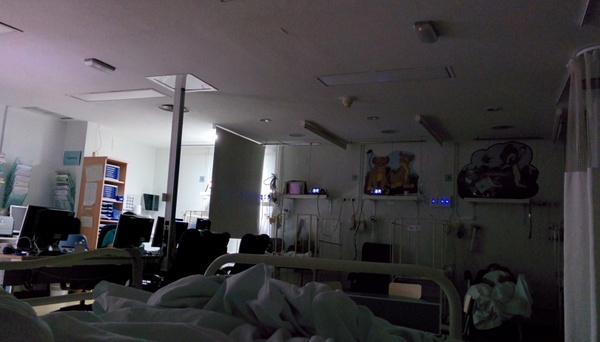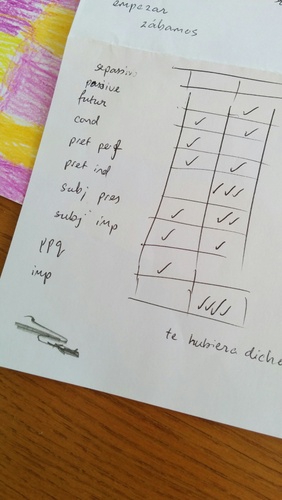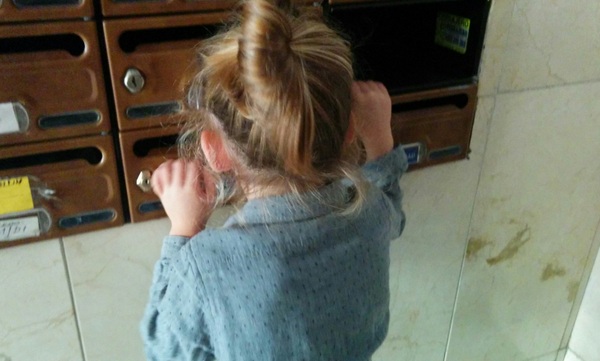Following the oral test for my DELE Spanish exam, I felt fairly shell-shocked. Admittedly, oral exams are a bit shell shocking. Having done three foreign language GCSEs, two language A-Levels and one language degree, and a DELF B2 in French, there was nothing unusual in the description of the exam. But, a little bit like in a driving test, anything can happen on the day. Like for instance they might change the format after you have spent hours studying the official website to work out what it will be like.
I already felt out of my depth. I had signed up for the B1 level which is supposed to be lower intermediate, apparently equivalent to a lowish A-Level. Students should be able to show the following:
- Understand the main ideas in clear texts
- Deal with most situations in a trip
- Produce simple texts on familiar topics
- Describe experiences and hopes, and briefly justify opinions or plans
I don’t remember being able to do all that when I got an A for French A-Level. Not smoothly, at least. It was once I was living in Paris that I actually learnt to talk. But I must have scraped through somehow.
I felt ridiculously underprepared. I hadn’t really studied enough to do the B1 exam, as I was only doing 3 hours of classes a week, and on the other days I didn’t have any babysitting. I hadn’t even finished the B1 course or the text book I bought for it. On the other hand the level below, A2, wasn’t really a challenge. With a background in French, reading is straightforward and writing not impossible. It’s frustrating to be able to read with ease, but only be able to stammer through a conversation, although I know from teaching English as a foreign language that it is all too common. So I was basically trying to get in through the back door, using French as a ladder to sneak in where I didn’t really belong.
I may have mentioned how impatient I am. So… I booked in the exam, rather than wait until autumn for the next chance to do it (I’m busy for the July exam date). In the end I shall probably have to do it in the autumn anyway, because failing one part means you have to retake the lot. That means the reading (70 minutes), the listening (40mn) and the writing (1 hour), too.
It started well. I was very glad I was given a slot for the Oral on the day before the rest of the exam. After the other tests, I would have been exhausted. I was already exhausted. Both kids had had a bad virus, consecutively, in the run up. For two weeks I hadn’t slept through, up at all hours mopping feverish brows and supporting little heads over the toilet bowl. With both kids at home, one flopped limply across my lap, or begging to be carried around the room, I basically didn’t revise. Still, you can’t learn how to talk a language in two weeks anyway, so the results might have been the same.
I was in for a surprise when I was led into a small room to prepare, I was given a dozen pieces of paper, six topics (or was it eight?) and six photographs and told to choose one of each. Each topic had a short article and a list of questions/points. This was not what I had read on the official site. Wasn’t I supposed to be given a choice of two offered at random, and wasn’t the photograph to come later, during the Oral, to be discussed without preparation? I was worried – it seemed they had changed things. What else would be different? I asked her but she had little to say. The staff were tense and rushed.
I scanned them all and chose one of each category. The topic I went for was teletrabajo, telecommuting. The staff member said I had 20 minutes to prepare. Isn’t it 15? I asked. I put my watch on the table. She checked and returned to say yes, 15 minutes. She came back in 12. When I said it had not been the full time, she told me we had walked into the room on the hour, which I’m sure is true.
I had prepared a little, not even looked at the photo. I wished I had not been given 12 bits of paper to leaf through in the first minutes. I could have done with those couple of minutes to prepare the topic I ended up with, whichever it was, as the guidelines for what the student should cover were very precise. I was to discuss a specific quote from the article, to say what type of work lent itself to working from home, to talk about whether I would like to work that way, whether my home country did a lot of telecommuting and what sectors were most appropriate. I would have used the time to better purpose. After all, students are not going to have a single topic they can speak about while being incapable of talking about any other. I had prepared to talk about ten typical topics by way of practise, but I knew none of them might be offered to me. As it was they weren’t, not one of them came up in the six.
The papers were taken away and I was ushered through. The examiner who was to be my interlocutor, smiley but hurried, set the stopwatch on her mobile and told me to start. I was surprised. Surely I was supposed to keep the sheet if I was to talk about the points outlined. In any case, very soon I was interrupted by the strident ring of her stopwatch. I had a lot left to say, and it felt like it had only been a minute, but it must have been two, I imagine, as it is supposed to be 2-3 minutes. Then the conversation, and the buzzer again; next the photograph. Except we didn’t have it. So the other examiner, the one who takes notes on your level while you talk, was sent to find a copy and came back with one to share. He disappeared in search of another and the rush was such that the interlocutor told me to get started all the same and not wait for him to come back.
Lastly we did the situación simulada, the dialogue. She raced through the brief description, which turned out to be inviting someone to come to a local festival and describe what it would be like. I would have preferred to have to return a faulty item to a shop, like in the practise. Still, I invited her to stay at my house during the festival, rattled on a little with a few subjunctives and told her how great it would all be should she make it. Her last question was where should we meet using quedarnos. Arranging to meet is a key skill at this level, but I was a bit thrown because I had already asked her to come to stay at my house before the festival began, and of course quedarse can also mean to stay. The buzzer rang again, and I was hurried out and found myself outdoors in no time. In fact I was in the venue for 35 minutes total for a 15mn oral with 15mn prep, along with changing rooms, paperwork and passport checks.
I came home thinking that it was a fat lot of good providing such detailed information on the website to help you avoid being struck by a bout of nerves if they then change the format without warning. But on second thoughts, I wondered if perhaps the format hadn’t changed; if perhaps the examination centre had changed it. Giving a choice of topics might be seen as a way to make it easier on the students. But personally I would have preferred to have the oral as described on the website.
I have to wait two months for the results, but since I’m generous I won’t make them wait so long. They get 2.5 stars out of 5 by my reckoning, penalised for not having thought to make sufficient photocopies; for booking the orals in back to back on a very tight schedule where crossing from one classroom to another counts within your exam time; and for not sticking to the instructions.
I made sure to get in plenty of conjecture and subjunctives, both present and imperfect, and a range of vocabulary. Still, I’m sure I made a tonne of mistakes along the way, especially every time the buzzer went off mid-sentence. And in the rush, my pronunciation probably worsened. In any case, if I have to take it again in October, I will be prepared for variations in format and know that I have to cut to the chase when covering the points listed. I noticed that while at least six different exam levels (A1 to C2) were held in that small language school that day, only three are scheduled for October, so perhaps things will be a bit calmer, too.
In the meantime I breathe a sigh of relief that it’s over for now, and sure that I’ll be better prepared next time. After all, over the next five months in Spain, my Spanish can hardly get worse. Really it ought to improve on its own, right?
**UPDATE** One year on I took the B2 and my review of that starts here.
Before the exam, I researched some expressions which trigger the subjunctive and which can be adapted to any context to make sure I could squeeze some in. Using the subjunctive isn’t only showing off grammatical knowledge, it really adds colour to a discussion, as you can see below:
sea que sea – be what it may
pase lo que pase – come what may, whatever happens
todo sea dicho – all told
por lo que sea – for whatever reason, for some reason
Puede que… – perhaps
Hay pocas personas que… – There are few people who…
Si fuera así,… – If it were so,…
Si yo fuera él, no lo haría. – If I were him, I wouldn’t do it.


